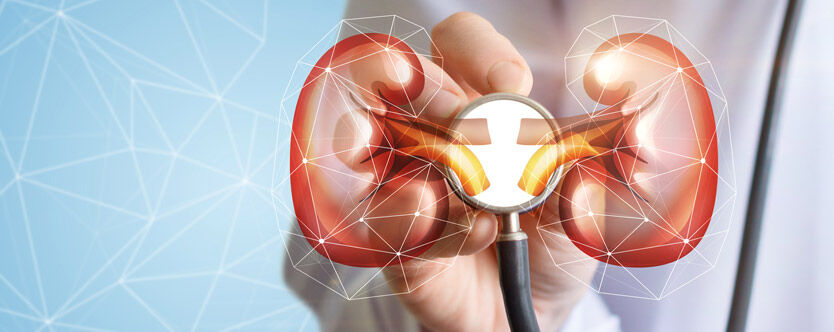
What to Eat if you have Kidney Stone?
If you’ve ever had a kidney stone, it’s unlikely that you will ever forget the experience. Kidney stones can be extremely painful and happen to be one of the most common disorders of the urinary tract.
The role of the kidney is to filter the blood by removing excess mineral salts and other soluble (dissolvable) wastes. The kidneys also produce the urine that dissolves these wastes and excretes them through the urinary tract. When a particular mineral is present in urine in large quantity, it saturates the urine to such a level that it can’t dissolve. This undissolved portion of the mineral forms crystals that then clump together and grow into hard stones, which can manifest themselves in kidneys or urinary tract (urolithiasis).
Kidney stone varies in its location, mineral content and contributing medical conditions, hence so should the line of treatment be. These stones can be as tiny as a grain (these ones usually pass out during urinating without much pain or discomfort) or as large as a lemon. These large stones may cause severe pain and at times, even kidney damage as they progress along the ureter, urinary bladder, and renal tubes.
The most common symptoms are pain and cramps in the back and lower abdomen, nausea, fever, burning sensation during urination and renal colic pain. The factors which predispose one to the risk of developing kidney stones range from genetics, metabolic disorders, sedentary lifestyle, wrong eating habits with overindulgence of junk foods, maida products, and acid-forming foods.
A major part of the treatment for kidney stone aims at preventing recurrences by adopting suitable dietary modification and medication. Since about 80% of all kidney stone are composed of calcium and other minerals, usually a combination of calcium and oxalate, dietary adjustments help to prevent the recurrence and also to alleviate the symptoms.
Kidney stone: Dietary considerations
The aim of the diet for kidney stones is to balance the intake of substances likely to form the stones (calcium, oxalate and uric acid) and to improve the ability of the kidneys to excrete waste products effectively. When stones are composed of calcium and magnesium phosphates and carbonates, the diet should be so regulated as to maintain acidic urine. On the other hand, if the stones are of calcium oxalates, then urine should be alkaline.
- Increase fluid intake. This is the most important preventive measure for all patients who develop kidney stones. It hinders the formation of stones by diluting the urine. If your daily fluid intake is around 2.5 litres, you reduce your risk of stone by one-third.
- Adopting a calcium-controlled diet under guided supervision usually helps. However, one must take care to maintain the calcium intake levels within a narrow range. This is because the body needs a certain amount for maintaining important functions. It’s better to have calcium with your meals as its supplements taken between meals can increase the risk of kidney stone. Patients on a calcium-controlled diet must always consult their physicians before taking any over-the-counter medication or vitamin supplement.
- There are many foods that contain large amounts of oxalate. But a few foods that can substantially raise the urine oxalate levels are spinach, strawberries, chocolate, wheat bran, nuts, beets, and tea. So, consume them in moderation.
- Sugar, sodium, and animal protein: Excess of these can aggravate the development of calcium or calcium oxalate stones. Avoid refined and processed packaged foods with large amounts of added sugars, trans fats, and excess salt. They interfere with calcium absorption and elevate its levels in the urine. A diet high in animal protein can also lead to kidney stone (especially the uric acid stones) by increasing calcium excretion.
- Insoluble fibre: Some of the best sources of are wheat, rye, barley, and brown rice. Insoluble fibre may help to reduce calcium in the urine. The phytates in fibres combine with calcium in the intestines. So, the calcium is excreted with the stool instead of through the kidneys. Insoluble fibre also speeds up the movement of substances through the intestine. Hence, there will be less time for calcium to be absorbed.
- Excessive intake of vitamin C supplements can increase the oxalate acid formation. So, consume in moderate amounts.
- Taking magnesium and vitamin B6 in natural and supplemental form aids to reduce the risk of stone. Magnesium helps to keep calcium in solution and prevents it from forming a stone. Food rich in magnesium include peanuts, almonds, wheat germ, whole wheat flour, tofu. Eating potassium-rich foods like barley, potatoes, wheat flour, cauliflower, and banana can help avoid stone formation. Glucosamine sulfate and chondroitin sulfate (found in high-fibre foods) may also play a role.
- Avoid kidney irritants such as alcohol, nicotine, spices, and caffeine.
